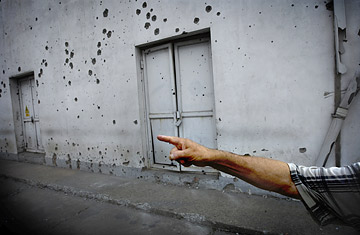
A worker of the Black Sea Georgian port of Poti points towards impacts from a cluster bomb as a result of a Russian air strike.
The ceasefire in Georgia was barely hours old before gunfire was replaced by another phenomenon that is becoming familiar in this part of the world. Tens of thousands of young and old, children and lovers, lawyers and factory workers, gathered in the city center of Tbilisi Tuesday night to call for change. In the past, demonstrations of this kind — in Belgrade, Kiev, and here in Georgia — have been aimed at ousting the local regime. In this case, the target was the bear next door, Russia, for having invaded their tiny country. It was not just an outpouring of nationalist sentiment (though there was plenty of that), but an unexpected demonstration of solidarity against a common foe.
"We are all Georgians today," U.S. presidential candidate John McCain said Tuesday. But it was eastern European leaders who showed up in force in Georgia on a sultry evening to reassure the huge crowd of Georgians. No fewer than six heads of state flew into Tbilisi to pay their respects and show their solidarity with this small nation of 4.5 million people. They included France's Nicolas Sarkozy and the Presidents of five other regional neighbors, including Poland and Ukraine. Sarkozy stayed behind closed doors, trying to hammer out a ceasefire agreement, but the others unabashedly threw in their hat with the Georgian side.
As the crowd waited, the atmosphere was part rock concert, part independence day celebration. Teens strolled hand in hand, swaying to the music, chatting and lighting candles. Roma worked the crowd for spare change. Red and white flags were sported as fashion accessories, bandanas, shawls, and miniskirts. "Sarko ! Sarko!" they roared in anticipation, before following up with "YUV-SHEN-KO!" Speakers boomed out rock and folk music, including a recent local hit called Freedom to which the crowd poignantly responded by swaying and chanting to the lyrics as if they'd been singing it all their lives. Even Georgian NBA basketball star Nika Tskitishvili took up the microphone.
Everyone mentioned the war. Georgian singer Buba Kikabidze said he was returning awards given to him by the Russian government and would cancel an upcoming concert at the Kremlin. Fellow singer Tamriko Chokhonelidze said she was sorry that the invader was an orthodox Christian nation, just as Georgia is, but "our spirit will make us have more children and our children will be speaking and singing Georgian." Georgian mothers, she said, will always sing lullabies to their children. Every so often, a speaker would shout "Long live!" and the crowd responded instantly with "Georgia!!".
It took more than four hours before the pack of eastern European presidents finally emerged from their negotiations to greet the crowd. They said they had watched the attacks of the past few days with a growing sense of anger and concern. "You have the right to freedom and indepedence," the Ukrainian head of state, Viktor Yuvshenko, declared . "Yours is the same story as Poland only the difference is that everybody is here, everybody is together," Polish President Lech Kaczynski concluded . "You are not alone!" Lithuania's President Valdas Adamkus said in English. "Let's stand together and victory will be on our side." The crowd was understandably ecstatic. "It's good for us! This has never happened before in the history of the world," says Shalva Nasaridze, 24 a lawyer.
It has, of course. But as the crowd strolled home, passing by a golden statue of St George, Georgia's patron saint, the locals hummed their national songs, talked quietly amongst themselves and savored the knowledge that for now, at least, they are not alone.
